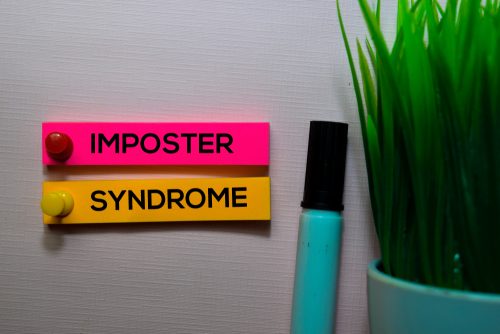Have you ever felt or done any of the following…
-
- Attributed your achievements and hard work to luck, other people (the team) around you, or something else, like being in the right place at the right time?
- Felt like a fraud?
- Felt like it was a only matter of time until someone discovered you actually aren’t good enough at what you’re doing?
- Waited for everything to come crashing down around you?
- Worked overly hard to try and be good enough?
Then you may have experienced ‘Imposter Syndrome’- the idea that you are a fraud, and someone will one day discover this. That you don’t deserve your accolades, achievements, promotion, or role- because you believe you are not as good or competent as others perceive you.
We know that imposter syndrome is:
-
- Higher in women
- Linked to poor self-esteem and low confidence.
- More prevalent in health and academia settings. (Although this may just be due to where the research has been done, rather than it being specific to health or academia!)
- Linked to perfectionism. And of course: you’d feel the pressure to do things perfectly so you don’t get found out!
- Linked to anxiety and low mood (Can you imagine the ongoing stress of feeling like a fraud that will be ‘found out’ at any moment? Of routinely doubting yourself and your decisions?)
- Linked to burnout, probably because people work doubly hard to do things well and perfectly to avoid being criticised or ‘outed’ as undeserving.
- Being part of a minority can contribute. Whilst I’ve already mentioned gender, if you have other intersecting minority groups too (think disability, ethnicity and race, gender identity, sexual orientation, being an emigrant, and so on), this can increase the risk of feeling like an imposter.
And whilst imposter syndrome often discussed in terms of the workplace, it also appears in other ways too. Like women who feel they are waiting for their partner to wake up one day and realise they weren’t actually good enough for them (this feeling can also be there with friends, too). Or women who feel like they are not good at adulting- like they are still children, and are just faking adulthood.
Here’s what we don’t discuss…
In the scheme of things, women have been in the workforce a short time- we’re talking around 100 years. We were let in during WWI, kicked out again, let in again around WWII, and then there’s been lots of pushing to be included since.
How many workplaces or social situations have you been doubted, questioned, judged, undermined, or asked to justify or explain your opinions or decisions? Been dismissed in some way- for example, as being emotional, hormonal, having other priorities, too chatty, bossy, or something else? Heard sexist comments or jokes? Been overlooked? Navigated hostility, insults, rumours, or harrassment? And throw in other minority factors too, and these layers of exclusion can double and triple up.
These may not be in your current social exposures or workplace, but if it has happened in the past- this can still make you feel like you’re undeserving and not good enough, and contribute to imposter syndrome.
The problem with imposter syndrome is that it locates the problem with an individual. I believe that women develop imposter syndrome because of what they have been exposed to in the environment, which whittles away your self-confidence (if you had it in the first place). There are reasons why women feel undeserving of their achievements, and it’s not just because they woke up one day feeling like this. And, it’s not just one or some of us: One review suggested that imposter syndrome varies widely, between 9% – 82%! Of course, different settings, genders, measures, and groups of people all contribute to these varied numbers. This review also suggested that social support is lower amongst those who feel like imposters.
Women have confidence problems because their environments have communicated that they aren’t worthy or deserving in some way. And I’m so sorry if this has happened to you, or that any of us have experienced this.
It’s not you; it’s what you’ve been exposed to.

